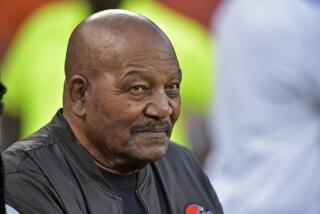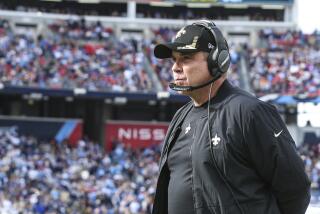Numbers Don’t Measure Payton’s Greatness
- Share via
Numbers never told the whole story when it came to Walter Payton.
His size and speed weren’t much to speak of. Even those gaudy records--an NFL-best 16,726 yards in 3,838 carries--seem almost secondary to the players and coaches who knew him.
So when asked to rank Payton among the greatest running backs in the game, his contemporaries describe a legacy that runs deeper than physical talent and is more substantial than anything listed in the record book.
“Statistics weren’t the true measure of his greatness,” Marcus Allen said. “It was his courage and his will. You look at a guy who wasn’t physically imposing but who was magnificent at what he did.”
Payton succumbed at age 45 to complications from a rare liver disease. His death came only 12 years after he left the game, only six years after he was inducted into the Hall of Fame.
The 5-foot-10, 205-pound back was remembered for bouncing off the pile and stiff-arming defenders, for twisting through the line, for turning short runs into long gains by sheer will. It was an attribute that earned him the respect of Jim Brown, an acknowledged curmudgeon from the game’s old school, who ranks Payton among the four or five best players ever.
“They talk about speed and about size and about how much a guy lifts, but they don’t talk about the heart of an individual,” Brown said. “Walter was not big but he was as strong as anybody alive. He had that intangible that made him a demon.”
So don’t expect Jackie Slater to mention the NCAA record for points scored that Payton set when they played together at Jackson State in the early 1970s. Instead, Slater recalls underestimating a teammate who stood six inches shorter and 80 pounds lighter.
“I remember a couple of times, just fooling around, I’d try to tussle with him, you know, sort of wrestling with him,” said Slater, who was 6-foot-4, 287 pounds. “Uh-uh. I was a lot bigger than he was but I found out you don’t mess with Walter.”
And don’t expect John Madden, who watched Payton as an opposing coach and later as a television commentator, to compare Payton’s running style to the fancier moves of Barry Sanders or O.J. Simpson.
Madden has another kind of memory.
“I remember asking him once what he liked doing best on the football field,” Madden said. “From most running backs you hear running, scoring touchdowns or leading the league in scoring.”
Not from Payton.
“Walter told me his favorite play would be knocking down a blitzing linebacker and having his quarterback throw a touchdown pass. That symbolizes what kind of a team player Walter was.”
The kind of player who became a leader of the Chicago Bears for 13 seasons not only because of his offense but also because, as former linebacker Mike Singletary said, he was the player who worked hardest at practice and told the most jokes in the locker room.
“The Bears had some tough years but, no matter how tough it was, Walter was the kind of person who could make you feel good about playing the game.” Singletary said.
“You don’t see that Payton attitude today,” Brown said. “You don’t see players fighting for every inch. Without the heart, all that speed and size is just wasted skill.”
More to Read
Go beyond the scoreboard
Get the latest on L.A.'s teams in the daily Sports Report newsletter.
You may occasionally receive promotional content from the Los Angeles Times.











